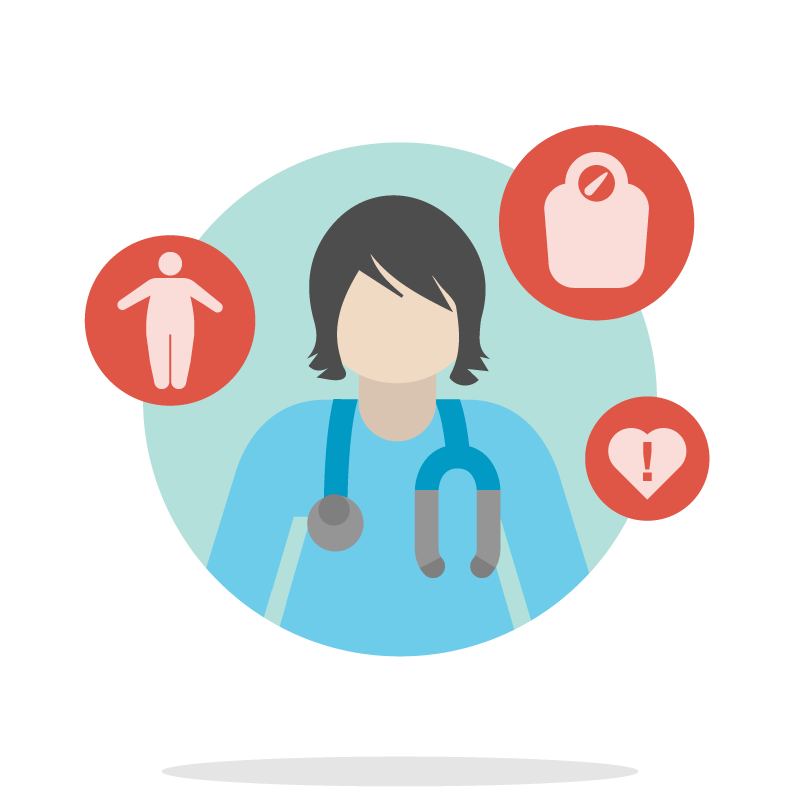QUICK SUMMARY
What is BMI? Body mass index (BMI) is a measurement based on your weight and height that places you in a weight category that ranges from underweight to obese.
Why it’s important: A high BMI can indicate high body fat, which ups your risks for obesity-related diseases.
Who needs it? All adults whose BMI is 30 or greater should discuss weight loss with their health care provider.
Good to know: Two people can have the same BMI but different levels of body fat.
What is a BMI?
Your BMI is the number that results from a formula using your weight and height as factors. That number puts you in a certain weight range category that can go from underweight to obese. To figure out your BMI, divide your weight in pounds by height in inches squared and then multiply the result by 703. The answer will fall into one of the following BMI ranges: Below 18.5 –– Underweight
18.5-24.9 –– Normal or healthy weight
25-29.9 –– Overweight
30 and above –– Obese
BMI doesn’t measure body fat directly, but it is a strong indicator of how much body fat someone has, especially for people whose BMI puts them in the overweight or obese categories.
Why is it important?
Having too much body fat can put you at risk for all sorts of weight-related illnesses and diseases. Being underweight can also come with risks.
And although BMI doesn’t directly correlate to how much body fat you have, it is usually a good indicator. Too much body fat can cause a number of health problems.
Screening for BMI can help identify if someone’s weight is an issue and lead to a plan to address those issues. For example, being obese increases your risk for coronary heart disease, Type 2 diabetes, various types of cancer, gallstones, and disability. Obesity is also associated with an increased risk for death, particularly among adults younger than 65. Taking the step of losing just 5 to 10 percent of your body weight could improve your blood pressure, cholesterol, and blood sugar.
Who needs It?
If your BMI is calculated during a doctor’s visit, that’s a good time to discuss the results with your health care provider. The U.S. Preventive Services Task Force (USPSTF) recommends that any adult with a BMI of 30 or higher should be referred for behavioral interventions, such as diet and exercise support, counseling, and weight loss groups. Most recent estimates show that only 18 percent of obese patients receive counseling for weight reduction, 25 percent for dietary change, and 21 percent for exercise.
What to expect
A BMI screening is very simple. You step on a scale and also have your height measured, which is all that is needed to calculate your BMI.
Your doctor may also measure your waist circumference. Having too much fat around your waist can increase your health risks. Women who have a waist size of more than 35 inches and men who have a waist size greater than 40 inches have a higher chance of developing obesity-related diseases.
To find out if your BMI is a risk, talk to your health care provider about the results. He or she might ask you more questions about your diet, how much physical activity you get, and your family history. Your doctor may also refer you for weight loss counseling or other help to get more exercise and improve your diet, including weight loss programs that have 12 to 26 sessions in a year and that include a variety of activities and strategies to help people lose weight.
Good to know
Your BMI alone can’t tell your full health story. In most cases, someone with a high BMI will have high body fat, but it’s possible they may also have a high lean body mass (muscle and bone). Certain characteristics also affect body fat levels. Even with the same BMI, women usually have more body fat than men, older people usually have more body fat than younger people, and athletes usually have less body fat than non-athletes.
Selected references
Centers for Disease Control and Prevention (CDC). Body Mass Index (BMI). Last reviewed May 2015.
U.S. Department of Health and Human Services. Health Risks of Being Overweight. Last updated February 2015.






